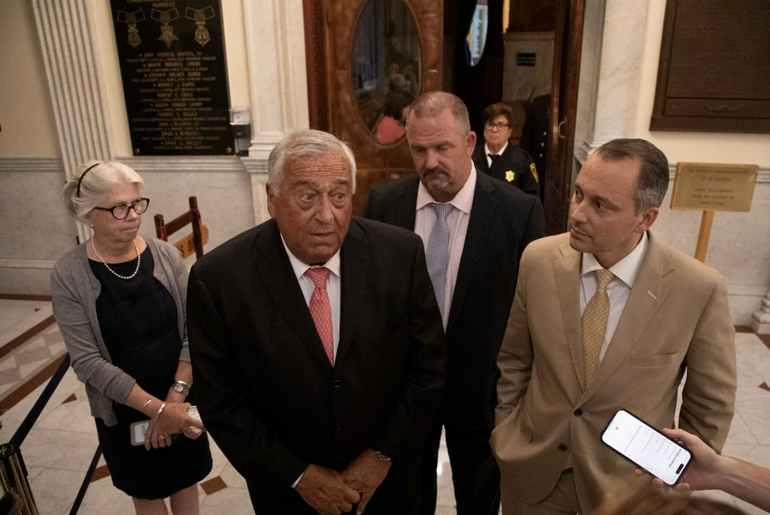As frustrations between the House and Senate Democrats mounted Wednesday night into Thursday morning, House Speaker Ronald Mariano decided to take his hospital oversight bill and a prescription drug bill that the Senate has prioritized off the negotiating table “for the better good,” he said early Thursday, leaving those key bills with uncertain fates.
The House and Senate had been in talks over new reforms to subject hospitals and health care providers to greater oversight in response to both the Steward Health Care crisis and longer-running industry problems, and on legislation to cap or eliminate out-of-pocket costs for certain popular medications that treat chronic illnesses and subject pharmaceutical industry middlemen to new scrutiny. Mariano and the House were big boosters for the hospital oversight bill and the Senate has been trying for years to get a prescription drugs bill to the governor’s desk.
But as midnight approached Wednesday, the scuttlebutt in and around the State House was that Mariano had personally made the decision to spike the two bills. Asked at about 6:42 a.m. whether there was any truth to that, Mariano responded, “Absolutely.”
“We were frustrated by the progress we were making trying to do the two bills at once. It was very difficult and there were other health care items scattered in other conference committees. So it was very difficult to compare trades and to effectively match up the bills. And we were getting frustrated, they were getting frustrated,” the speaker explained. “And those two bills that we sent over — I think one was unanimous and one I forget, two negative votes — are too important to get lost in the shuffle and get watered down. So I wanted to get away from the frustration that my staff was going through, and the Senate staff was going through. And we did that.”
Mariano added, “We will continue to work on these bills and continue to try and match up the like systems and get a good pharmacy bill.”
Negotiations over both bills were led by Rep. John Lawn for the House and Sen. Cindy Friedman for the Senate. Democrats Rep. Frank Moran and Sen. John Cronin were also on both panels.
Pressed on how the health care bills could be “too important to get lost in the shuffle” but also not so important that they had to pass, Mariano said he would “rather have a good bill than a bill with errors and mistakes and mismatched sections.”
“You know, it’s not easy to do. It’s my priority. It’s not easy to give up my priority. But I did. I did it for the better good. I did it for my members,” the speaker said.
Mariano said early Thursday that he is “pretty confident that health care bills will get through” during the informal sessions that will occupy the House and Senate’s time through the end of the two-year term in January.
“The track record on both of them were pretty good. One was unanimous and one was, I think, two votes against,” he said.
Taking on major bills during informal sessions will also mean making major public policy decisions during campaign and election season.
The House and Senate both passed their prescription drug bills unanimously. The hospital oversight bill passed the House on a 152-1 vote (Republican Rep. Nick Boldyga was the lone vote of dissent) and the Senate passed its version 38-2, with Democrat Sens. Marc Pacheco and Mark Montigny voting against the measure.
Shortly after Mariano detailed his reasons for spiking two significant health care bills, Senate President Karen Spilka said her branch was also willing to keep the talks going, even as the path to the governor’s desk becomes more complicated as any one lawmaker’s objection can stall a bill during informal sessions.
“We’re always willing to continue discussions and work to get the bills done, whether it be economic development or climate or health care, for that matter,” she said. “We’re willing to continue to work because they are important, very important bills. And we’ll continue to, if we can, get the policies and get them passed.”

